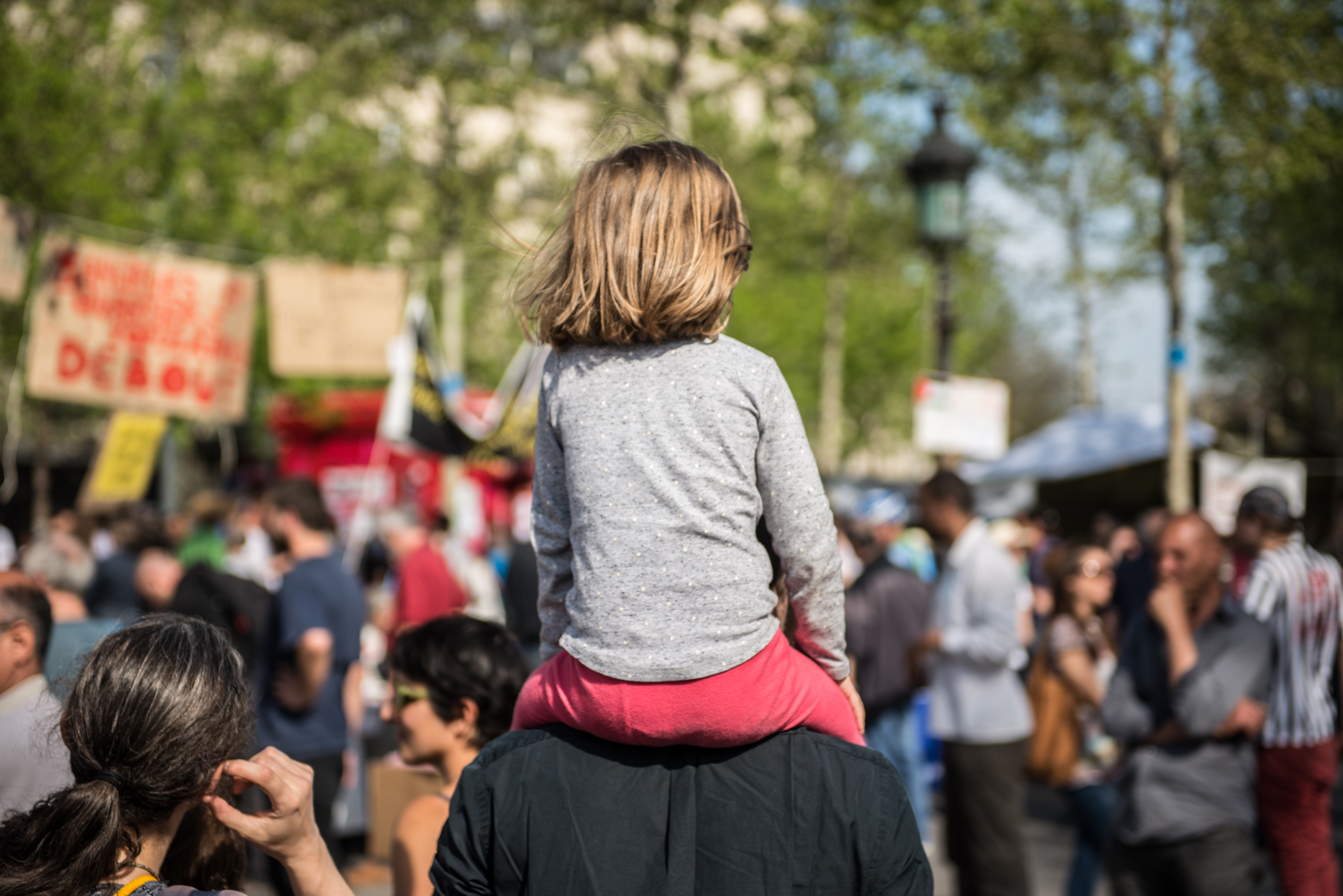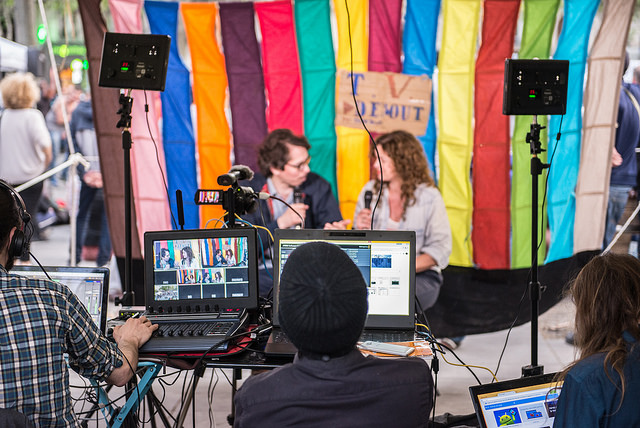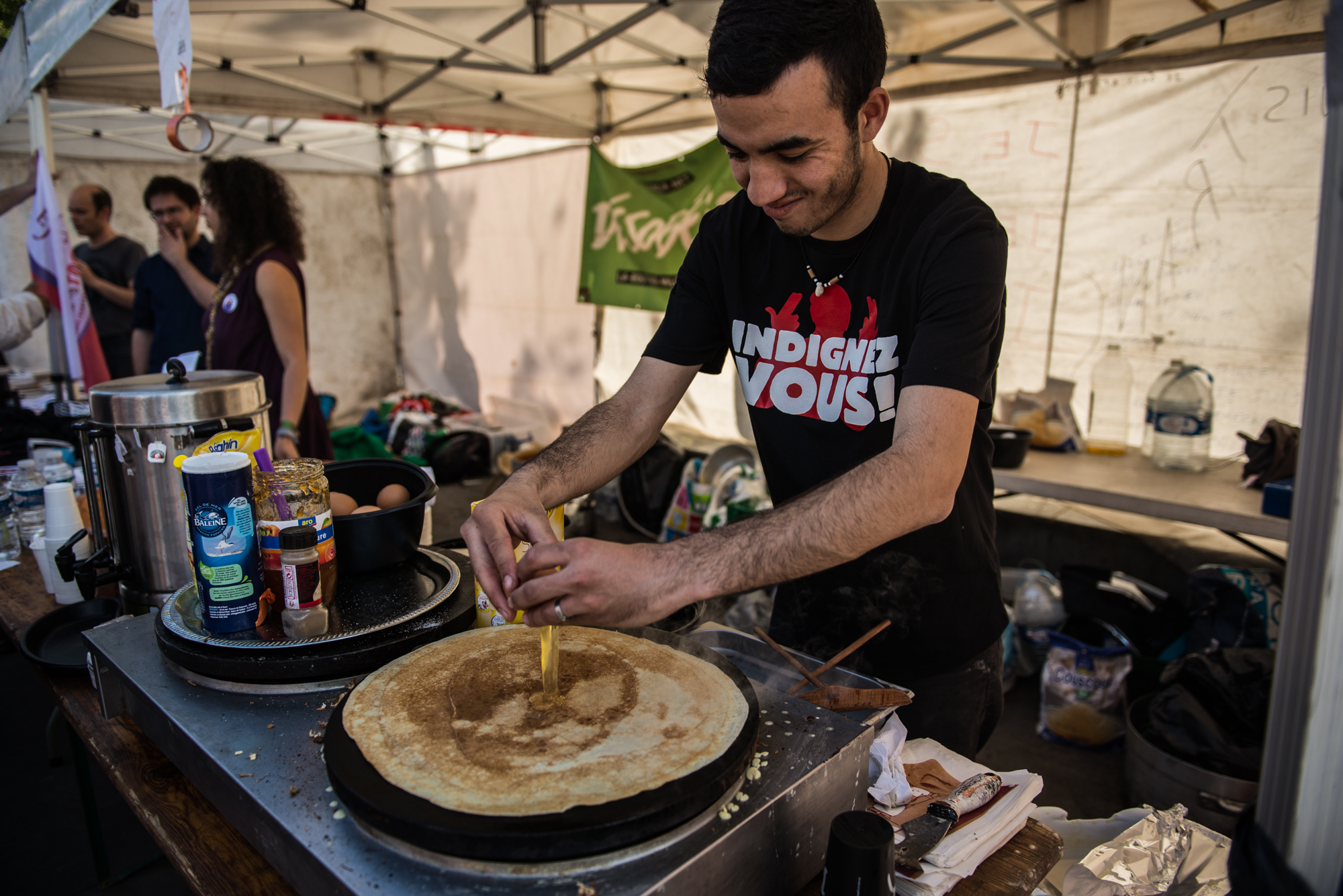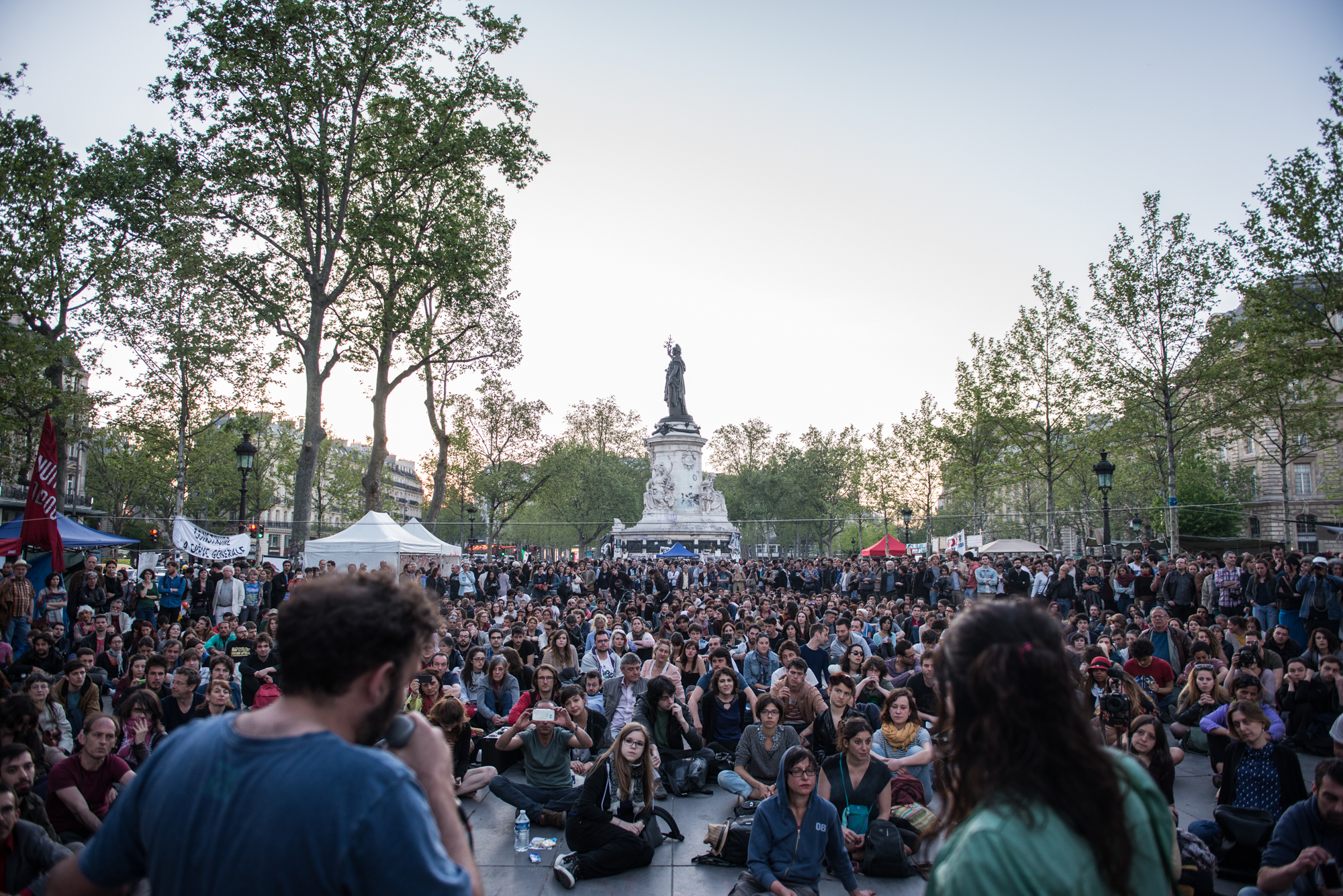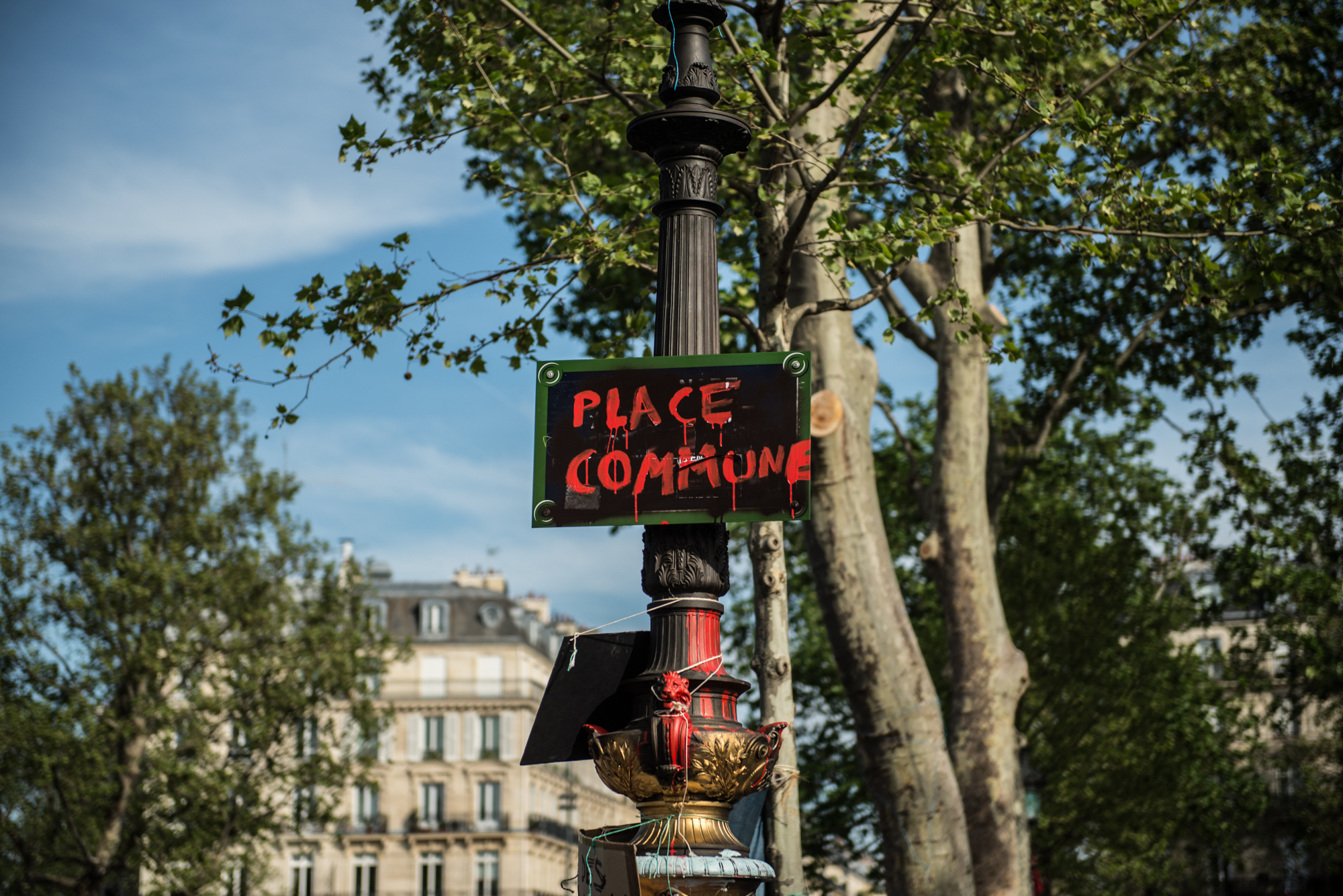Finding warmth in a dark place: a glimpse of #NuitDebout
- May 14, 2016
Anarchism & Autonomy
Paris had been so tough and so stuck. Recharging on the energies of a square full of people in buzzing encounter, it refound a collective way of being.
- Author
Last weekend, Nuit Debout’s international working group organized two days of assemblies and action planning on the Place de la République in Paris. Some hundred people came from all over Europe and beyond to get to know this new movement in one of the heartlands of the European crisis.
No one expected to be quite so moved, I think. The cycle of square occupations that started in 2010 seemed far away, and entering Place de la République at first felt like an awkward déjà vu. People sitting on the concrete of a big urban center debating; the kind of very open democratic process that sometimes makes debates multiply issues and run into strange personal forays; an overwhelming amount of commissions and initiatives; and placards, signs, flyers and slogans everywhere.
Even those of us who came from the South felt like we just arrived from a cold, placid place compared to what was going on at Place de la République. The first effect was to be overwhelmed, having missed the structures we got used to as activists of a generation that grew up with the politics of the Occupy movement, the Arab revolutions and 15-M.
The 2016 we came from was a dark place where many hopes had been shattered and many struggles had taken on a tougher dimension, whether because of mounting racism in the North or because of the tough challenges of entering into institutions in places like Greece and Spain.
To encounter a place so alive was thus a shock at first. As always, it takes time to arrive in a radically different scenario. You have to tune in and listen, not just hypothesize. Bit by bit, as the sun came out more in the Paris sky, we entered into the flow of the square: the conversations, the congregations, the digressions, the logistics, the waiting, the radical openness of it all.
Every collective movement has its complex rhythms, just as any language and place does: its singular ways of flowing. To understand and engage with collective assemblages such as a temporarily occupied square or an assembly, it takes time to watch and listen into the flows in and out, the processes, dynamics and tensions within.
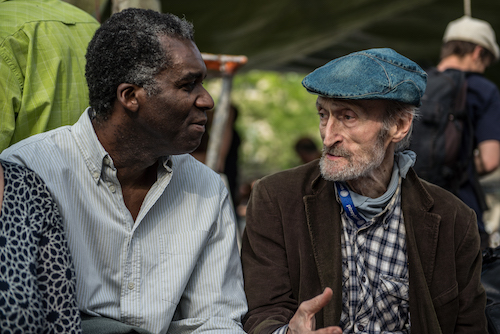 Watching the square fill up on Saturday is what did it for me. The morning was calm, sunny — nothing but a few of us from abroad gathering to discuss by a small tent, some passersby stopping for a bit. Yet we knew that the particular flow of Nuit Debout consists in afternoon, evening and nightly gatherings, which temporarily take the space without camping there.
Watching the square fill up on Saturday is what did it for me. The morning was calm, sunny — nothing but a few of us from abroad gathering to discuss by a small tent, some passersby stopping for a bit. Yet we knew that the particular flow of Nuit Debout consists in afternoon, evening and nightly gatherings, which temporarily take the space without camping there.
Then the clock struck 6pm and silently, almost imperceptibly at first, bodies began to flow in and gently fill the vast Place de la République. Tents went up, people helping each other and chatting, and tables with radio equipment, coffee and tea, flyers and books, lots of small sound systems around which people started to gather in circles.
Before I knew it, the square was pulsating with political debates and encounters, a vast array of thematic and practical endeavors, hundreds of people sitting, standing, watching, moving around or passing by. Their faces open, listening, interested and exposed. When you move in an open space of anonymous sociality, in a space radically open to conversation between strangers, your body takes on a certain posture and attitude, of intense attention and relaxed friendliness at the same time. My body had forgotten.
My body had forgotten a lot of things; sitting on the dirty concrete of a public square, for example. Our bodies — I daresay not just mine — were reactivated with a certain memory, of relationality and affect. It’s those embodied memories that are the most powerful for creating collective ways of being together, forms of subjectivity that come to last because they build on shared new habits in space.
We all still had traces of those memories and habits with us, from the various movements of the previous cycle, but we had also forgotten a lot. Being able to get to recharge on the energies of a square full of people in buzzing encounter, I felt in a strange place between past and present sometimes, slowly overcome by this wild happiness of finding back a precious collective way of being.
The appearance of messiness gave way to seeing a lot of collective intelligence, listening, respect and humor. Observing a collective breaking out of loneliness, alienation and fear, in this tough city and its super tough current moment. Little leaps of faith, small efforts of patience, minor gestures of generosity all the time. For those of us who came from abroad, it was quite something to witness hundreds and thousands of people break through such deep darkness to find each other in the streets and squares, to fill the dead silence with hundreds of singular manifestations of being together and needing to connect and talk.
Paris had been so dark, so tough and stuck. I remember it well from regular visits: the harshness and alienation of people rushing through the tunnels of the metro, the brutal separation of the white center from its post-colonial banlieues, the repression of the forms of expression emerging from the suburbs, the fake discourse on the veil, now also the simmering fear of extremist attacks, the mourning and deeply uncomfortable celebrations of national togetherness, the hushed sense of resilience and the racist policing flourishing in the current state of exception…
The state of exception as state of silence, as dead point of collectivity, degree zero of solidarity, brutal alienation — and then the importance of France historically and politically, for struggles and also within the European Union. The breaking open of all that, in humble gestures of walking into a square, setting up tents, kitchens, a radio and TV station, play area, music sessions, protests, assemblies, people just lying on the ground talking, all of it “debout”, with one common sense and objective, namely to break out of this deadly silence and survive collectively.
The labor reform was a perfect trigger, yet Nuit Debout reaches miles and miles beyond this single issue and objective. It appears to have grown into a full-flung movement of collective production of space, meaning, being. Beyond the morbid formulas of citizenship, it re-produces the city in a new way, deeply transforming relations within.
My body remembered again that it can just sit down whenever it feels like it. Dirty concrete becomes so delicious when you can put your ass down on it with others. People looking around, everybody taking this situation in, thinking, smiling, sharing ideas and doubts. A very generous and dignified space, quite diverse and beautiful. Of course the task of linking to the constitutive outsides and insides, the banlieues and non-white communities, is huge and far from being accomplished. It is indeed the greatest task I would say, greater than stopping the labor reform.
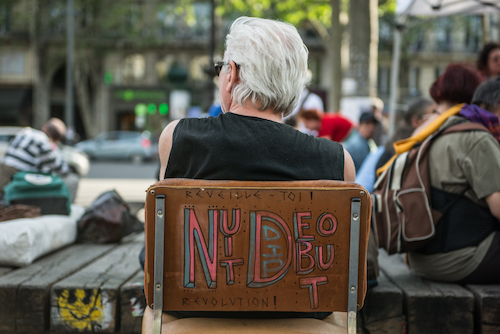 If these links can be created — and they are being sought and made, through calls and actions of #BanlieuesDebout, through efforts to decentralize parts of the movement, to bring the issues that matter beyond the white center to the square — then this movement will turn into a tiger, with unstoppable force. It’s that very challenge and possibility of social composition beyond the divide-and-rule of the state, of actually building another kind of society in the heart of Europe, that is the most dizzying prospect of a movement like Nuit Debout.
If these links can be created — and they are being sought and made, through calls and actions of #BanlieuesDebout, through efforts to decentralize parts of the movement, to bring the issues that matter beyond the white center to the square — then this movement will turn into a tiger, with unstoppable force. It’s that very challenge and possibility of social composition beyond the divide-and-rule of the state, of actually building another kind of society in the heart of Europe, that is the most dizzying prospect of a movement like Nuit Debout.
One step at a time, with each step felt and embodied, inhabited and collectively processed. In this sense, Nuit Debout is unlike the struggles of the 2011 cycle: it doesn’t merely respond to austerity and neoliberal reform but also to the deep political crisis that Europe faces today, one that can only be resolved by finding other ways of relating in our cities.
So we drifted around the square for three days. Not knowing what to expect, I think I wasn’t the only one to carry with me a vague sense of apprehension at first, not so much at the space but at yet again participating in the loose activism of international meetings, wondering what other forms of organizing across places we might invent.
Yet somehow this journey worked, more than many a trip to an international gathering. It left us strongly affected because we could witness and learn, as well as give strength and solidarity through our presence, at a moment of great creativity and also vulnerability. We were drawn by the prospect of finding each other in a vibrant space of composition and relating, of finding back things across our bodies and voices, more than by the prospect of a virtuosic debate on the future of Europe, or by a concrete network-building project. Somehow it worked.
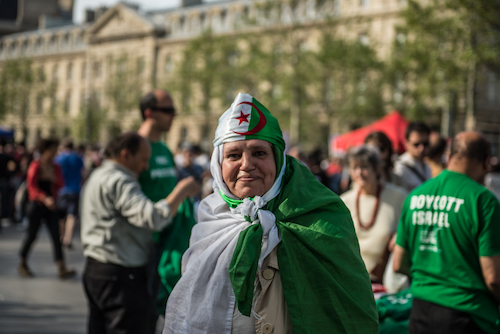 We made unusual encounters, found unexpected constellations, got collective strength not just from being in the midst of a powerful laboratory of social subjectivation and inhabiting, but also from being in it together with people from our cities and other places. Nuit Debout seems far from self-referential to me in that sense, given the warmth of their welcome and the sense of being far more than a “French” movement — anything but that, even.
We made unusual encounters, found unexpected constellations, got collective strength not just from being in the midst of a powerful laboratory of social subjectivation and inhabiting, but also from being in it together with people from our cities and other places. Nuit Debout seems far from self-referential to me in that sense, given the warmth of their welcome and the sense of being far more than a “French” movement — anything but that, even.
On Sunday, tents and assemblies started even earlier, and the sense of liveliness was intense in the unexpected sunshine. There was a big assembly in which feedback from the international meeting was transported. Translation was always impeccably careful and patient. Facilitation, too, was impressive, with a lot of listening and clever methods for decision-making and taking turns. For the voting on some of the movement’s organizational structures, multi-color cards were handed out, and I had a sense of great collective intelligence being at work.
Around the main assembly, a dozen or so smaller ones. The housing commission impressed me: a circle of about fifty people, with lots of migrant women, punchy stickers worn by people (my favorite was a woman who put the anti-eviction sticker on her hijab; best reply ever to that damned French veil debate), talking of international struggles and planning actions. There was a quiet but very powerful pulse there that reminded me of the anti-eviction movement in Spain and housing struggles like Kotti und Co in Berlin, radically diverse laboratories of social composition and collective reproduction.
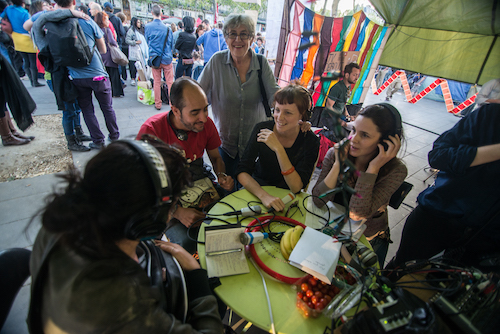 On the other side of the square, the tent of Radio Debout, a highly energized tent with tables of equipment and small snacks, with many hosts, interviewees and observers clustered around them. They broadcast live, switching between interviews and assembly debates, and chant their jingle live every so often, with everyone around — hilarious brief sonic interruptions in the main assembly’s acoustic landscape. Also TV Debout circulates on the square and has a little studio talking to people, visitors. And there’s a pay-as-you-like kitchen, a very sophisticated game and play area, lots of jams and performances, and much more.
On the other side of the square, the tent of Radio Debout, a highly energized tent with tables of equipment and small snacks, with many hosts, interviewees and observers clustered around them. They broadcast live, switching between interviews and assembly debates, and chant their jingle live every so often, with everyone around — hilarious brief sonic interruptions in the main assembly’s acoustic landscape. Also TV Debout circulates on the square and has a little studio talking to people, visitors. And there’s a pay-as-you-like kitchen, a very sophisticated game and play area, lots of jams and performances, and much more.
One of the decisions taken at the international and regular assemblies was to go for a day of action on May 15, calling for participation in cities across the world. Many of those who left Paris to return to other cities and countries are quite inspired to build continuity for this moment, to see how they can let themselves be affected in their own cities and struggles. We’ll be watching Paris for sure, now that we finally fell in love in that city — without romanticism but with a lot of gut feeling.
Source URL — https://roarmag.org/essays/international-nuit-debout-meeting-paris/


